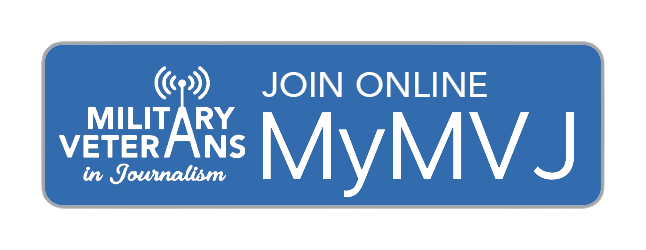
The Sword & Pen podcast booth at the MVJ2023 Convention. Here, Lori is joined by podcast guest Juan Carpanzano. Photo courtesy of Russell Midori.
On this special episode of Sword and Pen, I had a wonderful opportunity to speak with four attendees during the 2023 MVJ Convention held at the New York Athletic Club on Oct. 5-7 in New York City. This was the first time the Sword and Pen podcast was recorded during the convention, and I couldn’t be more thrilled to have such diverse perspectives on the show.
As I sat at my remote podcast booth during the career fair, I cajoled unsuspecting guests to join me behind the mic. What made it more special was the background chatter of veterans, their spouses and those who support our MVJ mission as they met with media companies and journalism schools.

Dan Clare, DAV’s chief communications and outreach officer, pictured here at their booth at the MVJ2023 DAV Career Fair. Photo courtesy of Lori King.
First up at the mic was Dan Clare, a Marine Corps and Air National Guard veteran. He was a military public affairs officer for 17 years and is now the director of communications for DAV, Disabled American Veterans, who sponsored the MVJ Career Fair.
Dan talked about his experience as the burn pit whistleblower; the value of having veteran voices in the media; and about his hope that veterans found jobs in newsrooms during the career fair. Not only did Dan operate a booth for DAV at the career fair, but he also sat on the Shaping News Coverage of Disabilities panel.

NBC News producer Patrick Martin, right, joins the NBC News team for the MVJ2023 NBC Newsroom Tour. Photo courtesy of Lori King.
Next up was Patrick Martin, an army airborne infantry veteran from Charlotte, North Carolina. He graduated from Columbia University – Graduate School of Journalism – and is now a producer for the NBC News Health and Medical Unit. Patrick came to the convention to give a tour of the NBCUniversal Studio at 30 Rockefeller Plaza. He also sat on the NBC panel.
During the podcast he talked about how important it is to get veterans in newsrooms, and his role as an NBC producer.

Evgenia Vlasova enjoys the MVJ2023 Opening Reception. Photo courtesy of Tim Belizaire.
Evgenia Vlasova is a Brooklyn-based video producer, editor and educator. She has been teaching at the New York Film Academy for eight years. Evgenia is not a veteran, but she is a member of MVJ.
She spoke about being a broadcast journalist in her homeland of Russia before she came to the United States, and how the Russian media is government controlled. She is currently seeking her citizenship. She also talked about the power of storytelling.
Juan Carpanzano hails from Bogota, Colombia and lives in New York City. He is a marine veteran who spent five years with Combat Camera.

Juan Carpanzano takes photos during a panel. Photo courtesy of Lori King.
He is an advance media studies major at Fordham University, concentrating in photojournalism. He talked about how everyone has a voice, and offered this for advice: Push, push, push, and be confident in yourself!
Connect with the guests!
Dan Clare: X | DAV.org
Patrick Martin: LinkedIn profile | NBC Health News
Evgenia Vlasova: Instagram
Juan Carpanzano: Instagram
Sword and Pen is a Military Veterans in Journalism production, and is brought to you monthly by host Lori King
Lori King: X @intro2pj | Instagram | Website
Got an idea for a podcast guest? Shoot me an email at [email protected]
























